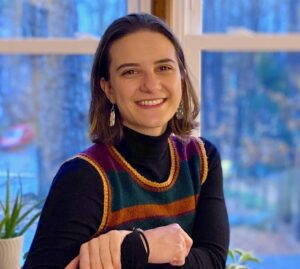
Isabela Gerdes Gyuricza is a PhD student in the lab of Jonathan B. Parr, MD, MPH, who is an assistant professor of infectious disease at the UNC School of Medicine and a founding member of the Infectious Disease Epidemiology and Ecology Lab at the Institute for Global Health and Infectious Diseases. In the lab, Gerdes Gyuricza uses computational tools and genomic analysis to investigate the ways malaria parasites evolve and develop resistance to drugs and diagnostic methods.
What were your interests when young, and how did you get into biomedical science?
As a child, I've been really into everything about biology. Back in high school in Brazil, I had incredible biology teachers who sparked my interest in science. I was specifically interested in stem cells and gene therapy and how science and technology combined could impact human health. My teachers guided me through the application process for college biology programs, which laid out my initial steps towards research and academia.
Why did you choose UNC and the lab you are in?
I chose UNC because of its great reputation, and I had co-workers and friends who had done their PhD here and they spoke highly of it. The research triangle area and its many work opportunities also seemed a great place to be after graduating. Also, I was looking forward to the warmth of the South after living for a few years in Maine!
What are you working on right now?
I study genetic epidemiology of malaria. My work involves using computational tools and genomic analysis to investigate the ways malaria parasites evolve and develop resistance to drugs and diagnostic methods, especially under the pressure of different malaria control approaches.
What inspires you the most about working in your field?
What inspires me most about my area of study is the impact my research can have on real-life problems.
Before my PhD program, I was working with mouse models and basic genetics, which is extremely important, but it felt too abstract to me. Now working with infectious disease and global health, I have a clearer vision of how my work could influence public health policies and make a real difference in people's lives. Take our projects in Ethiopia as an example: we've collaborated closely with the ministry of health, and I've had the invaluable opportunity to visit our study sites and meet with our partners in person.
Additionally, our lab is extremely diverse and it has as many international researchers as Americans, which makes it such a welcoming place to be as a foreigner. It's these experiences with the Parr Lab that have been truly eye-opening, reminding me how fortunate I am to be part of such amazing research group.
What are your goals after earning your PhD?
After my PhD, I aim to either join a non-profit that focuses on global health or have a governmental role, perhaps at organizations like the Centers for Disease Control and Prevention or the World Health Organization. My goal is to conduct independent research that deepens our understanding of how scientific discovery can inform public health policy.






